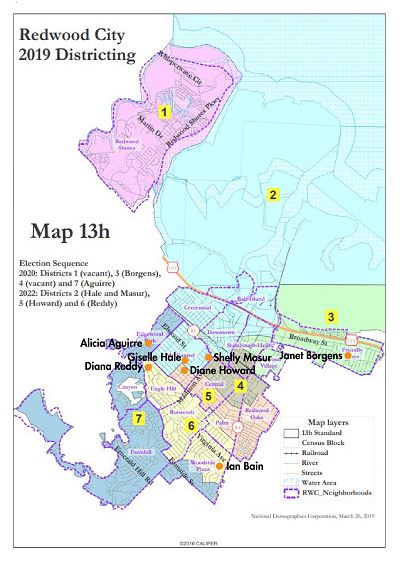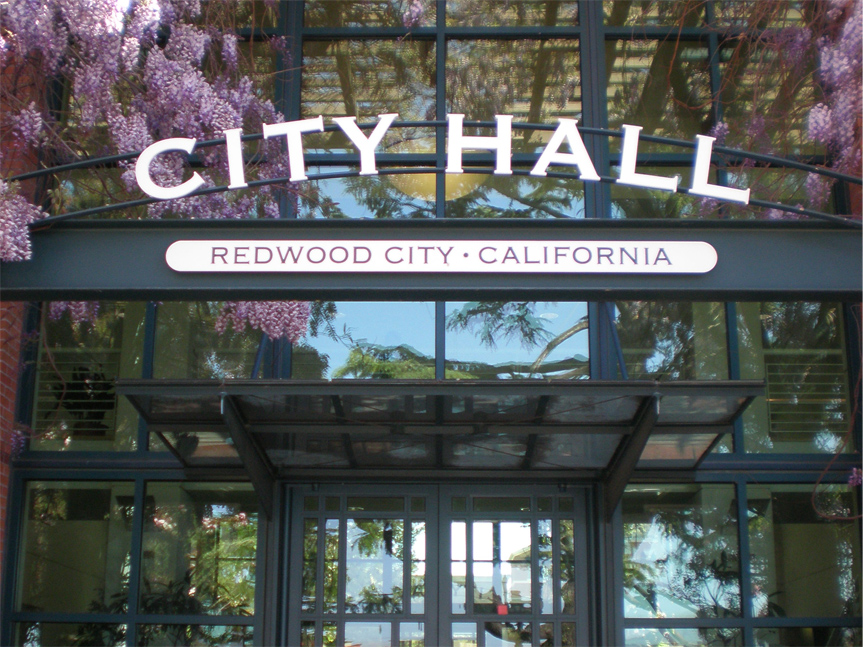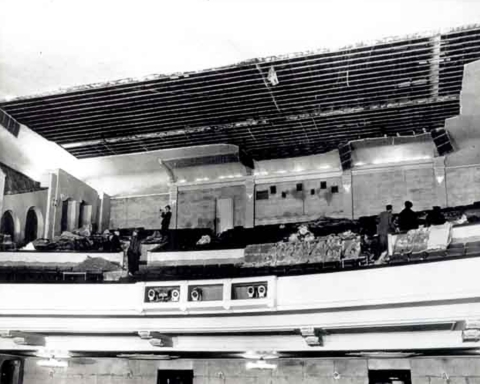As Redwood City hits the reset button on its turbulent districting process, one thing appears certain: The city is going to end up with two districts in which Latinos will be the majority of the voting age population and a third district heavily dominated by an Asian-American voting population.
This will be distressing, no doubt, to those who want to preserve the status quo, which was well represented by the district map adopted by the council nearly a month ago by a 4-3 vote, a map now abandoned in the face of legal challenges that the council was warned were all too likely to be successful.
We can dwell on the fact that the council appeared to adopt a set of maps that was illegal. Or that in a city that is more than 52 percent nonwhite and nearly 40 percent Latino, the council managed to adopt a map that created only one minority-majority district. Or that the council, cautioned by a consultant not to negate the will of the voters who elected them, appeared much too focused on making sure that the sitting council members had a district all to themselves. Or that the consultant who gave them all this advice apparently is working on other projects now.
Not only can we dwell on these things, it appears we did.
For those of you just joining us, the reason for dividing up Redwood City into council districts is that the city is moving from an at-large system, in which all seven council members run for office citywide, to a system of seven districts, where voters elect only the council member who lives within their district. The city was compelled toward this transition under the threat of a lawsuit asserting the at-large system was systematically diluting the electoral impact of minority residents and denying the opportunity to elect more minorities to the council. The seven-member council has only one Latina.
There are those who are unhappy that the city’s political fortunes are being determined along racial lines. I can assure you there are plenty of ethnic minorities who know just how that feels.
Meanwhile, there is an expected amount of maneuvering already underway and speculation about who might run for which districts.

We won’t know how that plays out until after next Monday’s council meeting, where they will review new maps (which are posted online here) that have been produced by the new lead consultant and by members of the public, and, presumably, start the process of adopting one. Until then, speculation can wait.
What is likely, however, is that incumbent Councilwoman Janet Borgens, up for re-election next year, is going to end up in a Latino-majority district.
It also seems clear the Latino community has some significant work to do identifying viable candidates in the new districts in which they will be the majority.
BUT WAIT, THERE’S MORE: If Redwood City was not the first penguin off the ice floe – that was Menlo Park – the process should be an object lesson to the other cities that are likely to face similar legal challenges to their at-large election systems, most notably San Mateo, Daly City, Foster City, Millbrae and South San Francisco.
Menlo Park appointed a citizens’ commission, which functioned largely independent of city politics. There’s an important distinction to be made, by the way, between a citizens’ committee, which is appointed by a city council, and a commission, which has an inherently more independent appointment process.
Of course, the net result of the process in Menlo Park is that two well-entrenched incumbents were defeated in the first all-district election, which may not be all that attractive to an incumbent council. Interestingly, the two winners were not the top spenders.
LABORING: This weekend’s 50th San Mateo County Progress Seminar in Monterey – the annual gathering of business, government and political leaders to work on the tough issues of the day — was almost derailed by a labor dispute at the Hyatt hotel that has hosted the event for as long as anyone can remember. The hotel ran afoul of a local union, which put up pickets and put the hotel on the no-fly list.
That would be a real problem for the elected officials who were planning to attend the event and curry support from labor for their campaigns, which is almost everyone, and who aren’t going to cross a sanctioned picket line.
But credit goes to Amy Buckmaster, president and CEO of the Redwood City/San Mateo County Chamber of Commerce, which puts on the Progress Seminar, and Julie Lind Rupp, executive officer of the county’s Central Labor Council, who worked out a temporary solution that allows the seminar to go forward at the original site. In essence, they got a one-time waiver for the weekend.
They reached the solution quietly, without a huge fuss and by working together in a collaborative manner rarely seen in labor-business relations. That’s an outcome that is uniquely San Mateo County.
THE POLITICAL CLIMATE: That is the name of the column, after all, and there are plenty of political tidbits to share.
Belmont Councilman Charles Stone is about to declare for the San Mateo County Board of Supervisors seat held by Carole Groom, who will be termed out in – 2022. Yes, she just got reelected last year. Nonetheless, Stone apparently feels compelled to start now because there are likely to be more than a few candidates for the seat. Among those who is openly saying he will run is San Mateo Councilman Rick Bonilla.
In the Groom district, San Mateo is the predominant city and Belmont is not even close. That’s reason enough, it appears, for Stone to start campaigning early and often in the hopes of gathering endorsements and money sufficient to discourage Bonilla and, presumably, anyone else. Among those also rumored as possible candidates are Maureen Freschet and Diane Papan, two of Bonilla’s colleagues on the San Mateo Council.
In San Carlos, where a Black Mountain development proposal – notably absent affordable housing – is likely to be one of the hot-button issues, incumbent San Carlos City Councilman Ron Collins is opting not to run for another term, which means the council is losing its most effective veteran. Incumbent Mark Olbert is said to be seeking a third term. The departure of Collins means the council will have four members in their first term.
Contact Mark Simon at mark.simon24@yahoo.com.
*The opinions expressed in this column are the author’s own and do not necessarily reflect the views of Climate Online.
CORRECTION: An earlier version incorrectly stated San Carlos Council incumbent Mark Olbert is seeking his second term, when in fact he is seeking his third term. The story has been corrected.






